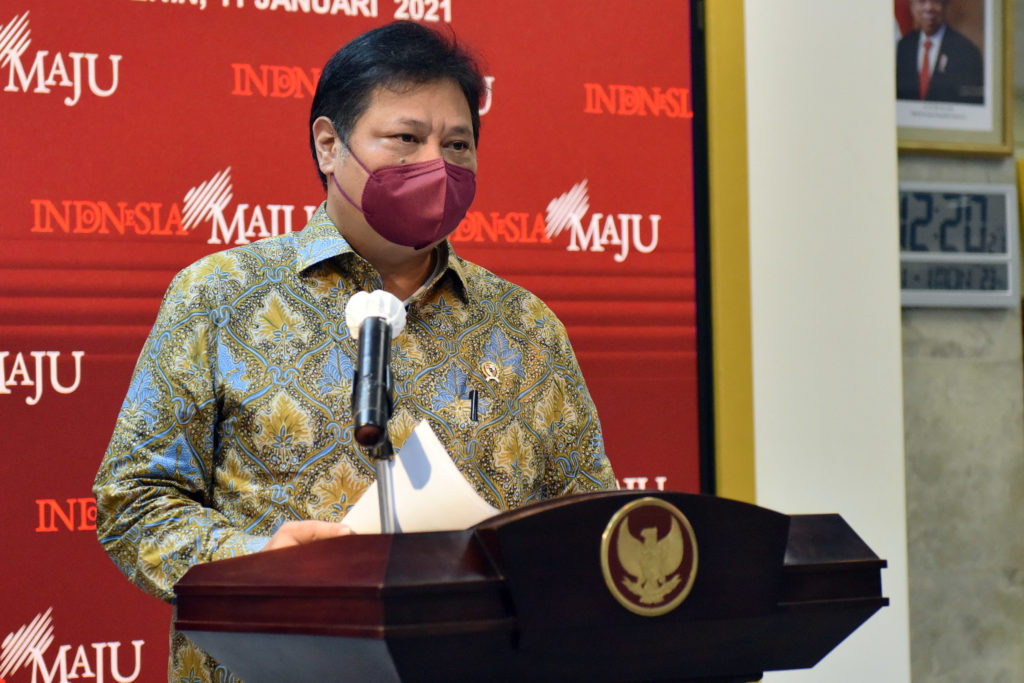Gov’t Boosts National Economic Growth through MSMEs

Coordinating Minister for Economic Affairs Airlangga Hartarto. (Photo by: Documentation of Cabinet Secretariat)
In an attempt to overcome the impact of COVID-19 pandemic in 2021, the Government has allocated Rp699.43 trillion for the National Economic Recovery (PEN) Program, higher than that of the previous year’s realization of Rp579.78 trillion.
One of the Government’s priorities is to provide support for Micro, Small and Medium Enterprises (MSMEs) with a budget allocation of Rp184.83 trillion.
“The Government is giving priority to the recovery of MSMEs due to their strategic role for the national economy. The contribution to national economic growth stands at 61.1 percent, absorbing 97 percent of the workforce (116.9 million workers),” Coordinating Minister for Economic Affairs Airlangga Hartarto, quoted from the website of Coordinating Ministry for Economic Affairs, Sunday (4/4).
The budget allocated to support MSMEs and corporate financing is provided through six economic stimulus packages, including interest subsidies for MSMEs, Micro Business Productive Assistance, Guarantee Fee Subsidy (IJP), Placement of Funds at Commercial Banks, Tax Incentives, and Loan Restructuring.
Based on a survey conducted by Ministry of Cooperatives and Small and Medium Enterprises involving 195,099 MSMEs, due to the pandemic 23.10 percent of MSMEs experienced a decrease in business turnover, while 19.50 percent experienced slow distribution, and 19.45 percent experienced capital constraints.
In the meantime, a survey conducted by the Asian Development Bank (ADB) also showed the same results; as many as 30.5 percent of MSMEs in Indonesia faced a decline in domestic demand and a total of 48.6 percent of MSMEs were temporarily closed.
“One of the Government’s measures to revive the MSMEs economic activity is by stimulating working capital through Smallholder Business Credit (KUR) with low interest rates and without additional collateral,” Airlangga said.
In 2020, KUR customers from MSMEs were provided an additional interest subsidy of 6 percent, so that the interest rate remained zero percent in April-December 2020. In addition, a Super Micro KUR scheme has also been set up for laid-off workers and housewives who do a micro-scale business.
In 2021, the Government has increased the additional interest subsidies by three percent, postponement of principal installments, and relaxation of the KUR policy in the form of period extension and additional KUR ceiling up to Rp253 trillion.
“The Government needs the cooperation of all stakeholders, including the public and MSMEs players in order to ensure that all policies can be implemented properly so that MSME business activities will be stronger and have the opportunity to leverage national economic growth,” the Minister said.
In dealing with the impact of the pandemic, the Government continues the efforts to handle the health issues and the economic recovery in a balanced manner through the implementation of micro-scale public activity restrictions (PPKM Mikro) which expanded to 15 provinces, as well as the 3T procedures (testing, tracing, and treatment), and the vaccination program throughout the country.
“All of the measures are supported by the National Economic Recovery (PEN) Program which continues to be pushed to strengthen the purchasing power (demand) and production (supply) side. In addition to constantly rolling out several programs to boost purchasing power, the Government also provides several programs to support the production side, speed up the vaccination program, strengthen the implementation of the Job Creation Law, and expand the implementation of PPKM Mikro,” Airlangga added. (PR of Coordinating Minister for Economic Affairs/UN) (RIF/MMB)








